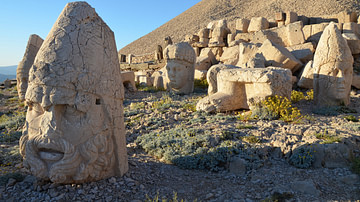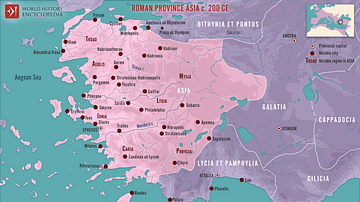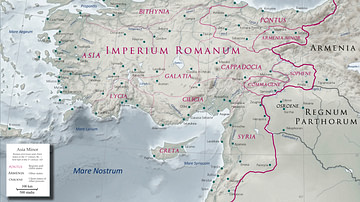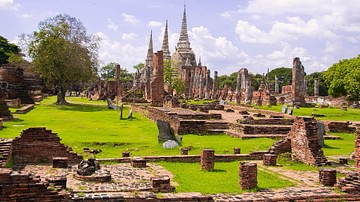Search
Search Results

Article
Fall of the East India Company
The British East India Company (1600-1874) was the largest and most successful private enterprise ever created. All-powerful wherever it colonised, the EIC's use of its own private army and increasing territorial control, particularly in...

Teaching Material
British East India Company - Interactive Lesson for High School
This interactive world history lesson takes a deep dive into the British East India Company and its expansion across the Indian subcontinent. Using interactive slides, students work through an interactive timeline, interpret maps, and complete...

Article
Exploring Mount Nemrut - A Meeting Point Between East & West
Set within the Anti-Taurus mountain range in southeastern Turkey, beyond the borders of Adiyaman, is the archaeological wonder of Mount Nemrut. Forgotten for centuries, the spellbinding peak of Nemrut Dagi (its Turkish name) has since managed...

Image
Roman Province Asia c. 200 CE
This map illustrates the Roman province of Asia around 200 CE. Established in 129 BCE following the bequest of the Attalid Kingdom of Pergamon to Rome, it encompassed western Anatolia (modern-day Turkey). It was a wealthy and vibrant region...

Article
Third Gender Figures in the Ancient Near East
In the ancient Near East, there was a social standard by which men were ideally expected to behave. In the 21st century CE, expectations still exist, albeit in different forms. Normative masculinity through ancient Mesopotamia typically concerned...

Image
Asia Minor in the Early 1st Century CE
Map of Asia Minor in the early 1st century CE with the Kingdom of Commagene as a Roman client state.

Article
Ayutthaya: Venice of the East
The royal city of Ayutthaya (ah-you-tah-ya) was a small kingdom in Siam (modern Thailand), and it was an unrivalled commercial and maritime power from 1350-1767 CE. Ayutthaya became the second capital of Siam in 1438 CE when it absorbed the...

Definition
Estado da India
The Estado da India (1505-1961) was the name the Portuguese gave to that part of their empire which stretched from India to East Asia. However, in its widest sense, the name includes all Portuguese colonies east of the Cape of Good Hope and...

Collection
The History of The East India Company
The British East India Company (EIC) was founded as a trading company in 1600. Run by a board of directors in London, the company employed a private army, first to protect the trade it conducted in the Indian subcontinent and then to expand...

Article
Conflict & Celts: The Creation of Ancient Galatia
Galatia was the most long-lasting and powerful Celtic settlement outside of Europe. It was the only kingdom of note to be forged during the Celtic invasions of the Mediterranean in the 4th and 3rd centuries BCE. From its foundation, Galatia...